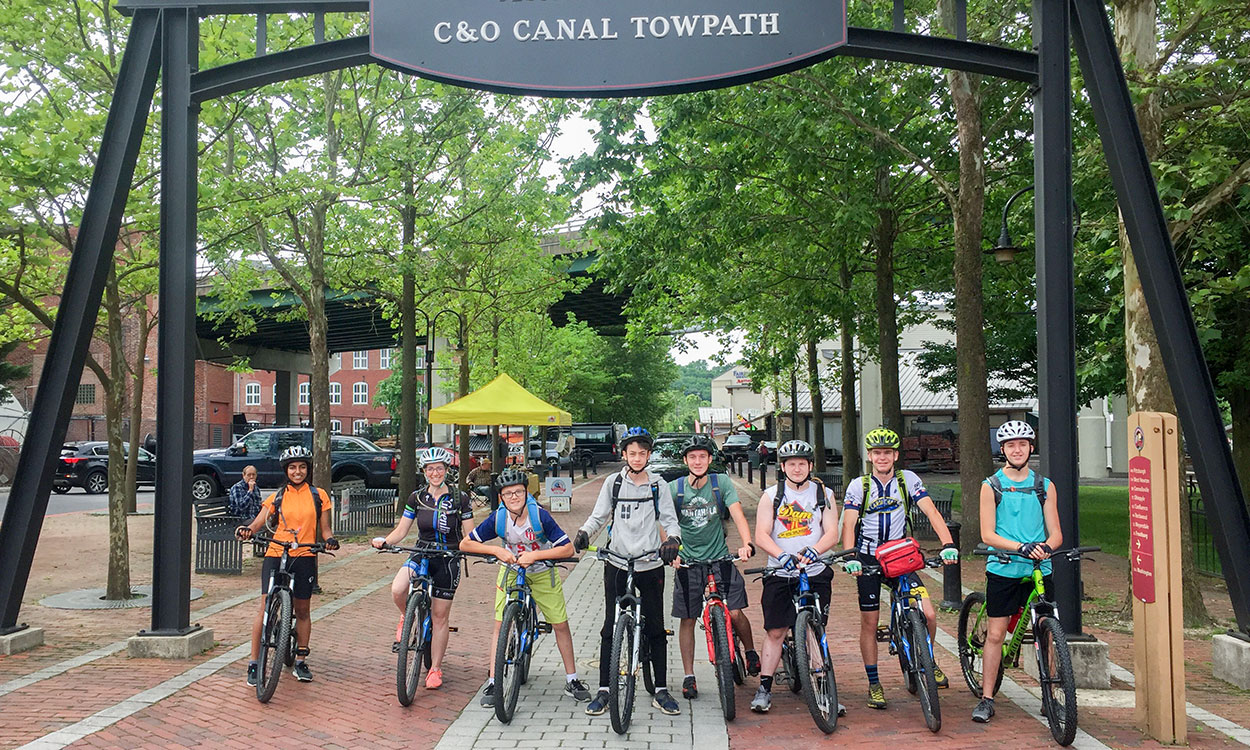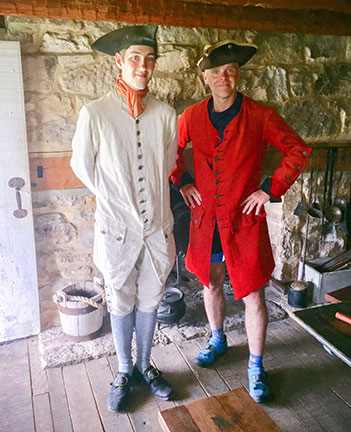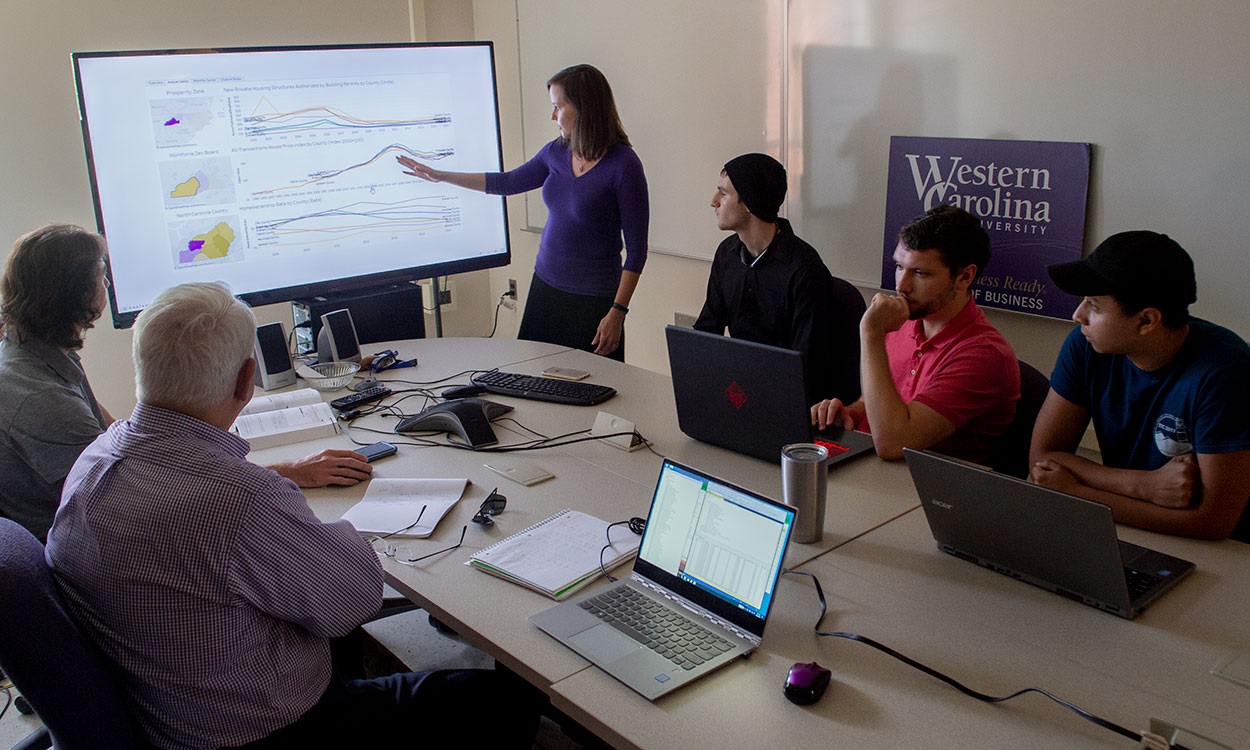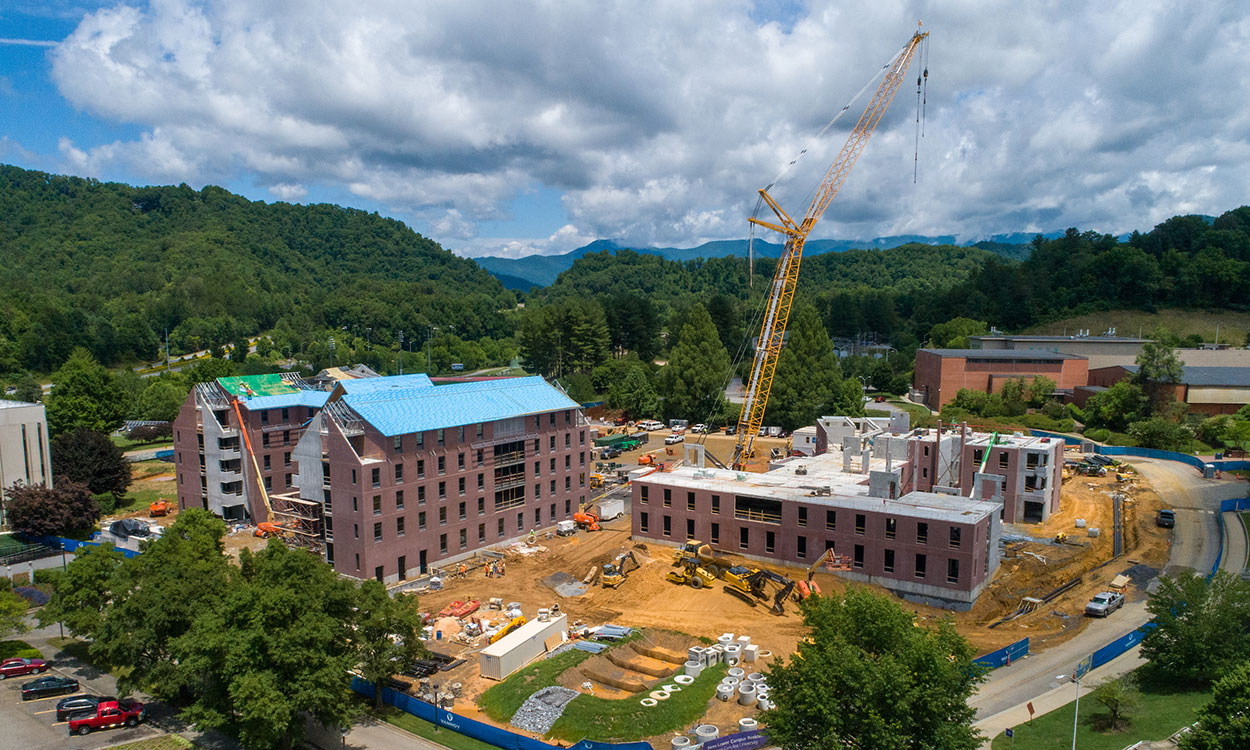Murdock’s last big adventure with Project Discovery kids is trip on C&O Canal

Students from regional high schools and middle schools get ready to begin their journey on the C&O Canal Towpath.
The cargo-laden boats and the mules that pulled them are long gone from the historic C&O Canal — save for a few reenactments each year — but the canal’s towpath still hums with activity these days, primarily by two-wheel commuters looking for a scenic ride and a taste of history. Among them recently, a group of cyclists from Western Carolina University’s Project Discovery program.
Led by Todd Murdock, program director for 25 of his 33 years with Project Discovery, the group of seven middle school and high school students and three staff members rode the length of the 184.5-mile trail along the Potomac River from Cumberland, Maryland, to Washington, D.C., where they ended their seven-day journey touring the nation’s capital. The group left Cullowhee on June 7 and returned June 13.
“The towpath is all dirt, there are no cars, and there’s tons of history,” Murdock said several days prior to the trip. He has taken numerous Project Discovery groups on the bike trail as part of the program’s experiential learning curriculum. “It’s not a difficult ride, so it’s doable for beginners. You finish in D.C., so you get to tour D.C., which is awesome. You roll off the towpath right in to Georgetown. About a mile from the towpath are all the memorials — the Lincoln, Jefferson, MLK, Vietnam War and WWII, which we’ll see on our bicycles because it’s the easiest way to do it.”
Project Discovery, also known as Talent Search, is a college access program funded by the U.S. Department of Education and hosted by WCU to help seventh- through 12th-grade students finish high school and graduate from college with as little debt as possible. The program serves the Western North Carolina region by providing a curriculum that includes career exploration, college visits, service learning, outdoor adventures and more. It costs about $480 for a student to be in the program for a year, which is paid by the grant, Murdock said. “If they get a college degree, and 52 percent of them do, they’ll pay that money back in taxes in three months. We’re a cheap date," he said.
Until six years ago, when the cost per participant went up, but the program’s budget did not, about 900 students a year participated in the program, Murdock said. “Now, we’re at a little less than 800. About 80 percent of our students enroll in college. We graduate 98 percent from high school and 52 percent from college. They’re primarily low-income and first-generation college students,” he said.
Students participating in the C&O trip were Dominique Hensley, rising 9th-grader, Clyde A. Erwin High School; Matthew Gray and Landon Matz, rising 9th-graders, Swain County High School; Phoenix Brooks and Sullivan Shanahan, rising 10th-graders, Robbinsville High School; Griffin Murdock, rising 11th-grader, Haywood Christian Academy; and Dhruti Senghani, rising 12th-grader, Swain County High School. Other Project Discovery staff on the trip were Jennie V. Sorrells and Jamy Beth Suminski.

Todd Murdock (right), director of WCU’s Project Discovery program, poses in uniform with a Revolutionary War reenactor at Fort Frederick State Park in western Maryland, one of the many historic sites along the C&O Canal.
Murdock, who earned his bachelor's and master's degrees at WCU, said he has used the extended bike trips — some have been as long as three weeks — to promote self-efficacy through a curriculum focused on situational leadership skills, conflict resolutions skills and group problem solving skills, among other things. “Each participant gets to be the leader for a day. So, we teach them how to give and receive feedback to each other and about positive and negative group roles,” he said. “We’re teaching them about what’s a good communication climate and about situational leadership theory, so when they’re the leader they have to assess the readiness level of the group, and then they lead in the style that fits that.”
On the C&O Canal trip, as with all of them, the group camped out nearly every night and cooked its own food. Supplies were carried in a van driven by one of the three adults, who rotated driving responsibilities with the other two, so there were always two adults on bicycles with the students. The van driver often drove ahead to the designated stop, then pedaled back to meet the group.
In the 25 years Murdock has served as the program’s director, he has brought in $9 million in grant money to the university. He has used nonfederal grants to purchase new bikes and rebuild old ones. Thanks to a grant from the Great Smokies Health Foundation Thrift Store in Sylva two years ago, he was able to purchase 10 new bikes for this most recent trip. He placed a donation box out at Motion Makers Bicycle Shop in Sylva to collect “used but not dead” bicycle clothing for students to use.
“Somebody asked me the other day, how long I had been rock climbing. I said, ‘oh, 35 years.’ They said, ‘do you climb outdoors, too?’ I just laughed. There were no indoor climbing gyms 35 years ago,” Murdock said. “The idea of outdoor activity has changed, but I think we need it more than we did. The research backs up experiential education. John Dewey (American philosopher, psychologist and educational reformer) was dead on the money. That’s how we learn best.”
Research on Murdock’s experiential programming by Andrew Bobilya, professor and program director of WCU’s Parks and Recreation Management Program, and Phyllis Robertson, professor in WCU’s counseling program at Biltmore Park, while still under review, bares out Murdock’s theory. According to the study’s conclusion, “Results of this study demonstrate the benefits of a short-term, adventure-based experience on youth’s perceptions of their skills and talents and provides direct application to the issues they will face when choosing to advance academically and face challenges that lie ahead in the college environment.”
The C&O Canal trip was somewhat of a sentimental journey for Murdock. He’s retiring this month after 33 years in the saddle, during which time he has pedaled and paddled thousands of miles across the country, encouraging his young charges to rise to the challenge and believe in themselves. With all that travel, does he have a favorite memory? Several, he said, but there is one in particular.
In 2005, he was taking a group of students on the last segment of a three-leg bike trip in honor of the 200th anniversary of Lewis and Clark’s expedition, which included biking and paddling much of the way across the U.S. The first two legs were in 2003 and 2004. In 2005, the group ended the trip with a 750-mile bike ride from Missoula, Montana, to Astoria, Oregon.
“One of the things all the kids will do when they get close to the end of the trip, close to the last mile, is take off — it’s horses to the barn,” Murdock said. “We had come down this road, and I’m looking at the map. I knew we were about to make the last turn. I stopped everybody and I said, ‘hey, when we make this turn, you’re probably going to be able to see the ocean.’ Then I read a quote from Lewis when he said, ‘the ocean in view, oh the joy.’ And then I told them I wanted them to enjoy this last mile, to savor it and to go slow. I didn’t want them crashing the last mile. Well, we turned that corner and they just took off — horses to the barn. I was yelling for them to slow down, and then I just let them go. Watching them hit the sand down there, that one stands out.”
An epic ending to an epic adventure, much like Murdock’s tenure with Project Discovery.

